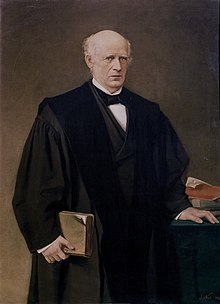Pascual Madoz
Pascual Madoz Ibáñez (born May 17, 1806 in Pamplona , Navarra , † December 11, 1870 in Genoa , Italy ) was a Spanish politician who, with interruptions, was a member of the Assembly of Estates ( Cortes ) between 1836 and 1870, and President of the House of Representatives from 1854 to 1855 as well as briefly President of the Provisional Government in 1868 . As editor of the 16-volume Diccionario geográfico-estadístico-histórico de España y sus posesiones de Ultramar , he laid the foundations for statistics in Spain.
Life
Madoz completed a law degree and then worked as a lawyer in Barcelona . In addition, he was involved as an entrepreneur in Catalonia . In 1834 he joined the newly founded radical progress party ( Partido Progresista ) and was elected for the first time as a member of the Estates (Cortes) in the elections on October 2, 1836 . He belonged to this first from the eighth to the end of the 14th legislative period on July 10, 1844 and represented the interests of Lérida there . On December 6, 1846, he was re-elected a member of the Cortes and belonged to it from the 16th to the end of the 20th legislative period on September 2nd, 1856. Between 1846 and 1850 he was the editor of the 16-volume Diccionario geográfico-estadístico-histórico de España y sus posesiones de Ultramar , the historical register of Spain including its overseas possessions, which contained all populations and statistical data of the municipalities of that time. In doing so, he helped to create the basis for statistics in Spain.
During this time Madoz succeeded Joaquín Baldomero Fernández Espartero as President of the House of Representatives on December 5, 1854 and held this office until he was replaced by Facundo Infante Chávez on January 24, 1855. Three days earlier he had been in the government of Prime Minister Baldomero Espartero took over the office of Minister of Finance (Ministro de Hacienda) and held this until June 6, 1855. In this position, he presented a bill for disamortization during the reign of Queen Isabella II . This disamortization, ordered by a general law of May 1, 1855, affected all rural and urban properties of the state, the clergy, the military orders, the brotherhoods, the pious foundations, the chapels, the "ex-Infante" Don Carlos , communities, charities and public education. Excepted from this were individually listed cases, which mostly concerned the buildings that were used directly for the purposes of the facilities or as official apartments for the employees there.
In July 1856, Madoz rejected the appointment of Leopoldo O'Donnell as district president and temporarily withdrew from politics. However, he was re-elected to the Cortes on October 31, 1858 and belonged to the Cortes in the 22nd and 23rd legislative periods until November 13, 1863. Most recently, he was re-elected to the Cortes on March 10, 1868 and belonged to it now until his death. After the overthrow of Queen Isabella II, he became a member of the Interim Revolutionary Government (Junta Revolucionaria Interina) on September 30, 1868 and was its president between September 30 and October 3, 1868. He was then governor of Madrid and a member of the commission which, to regulate the succession to the throne after Isabel's overthrow, offered Amadeus Ferdinand Maria of Savoy the crown, whereupon he was elected king on November 16, 1870.
He died in Italy in 1870, but was later buried in the Cementiri de Montjuïc , Barcelona.
Web links
- Entry on the homepage of the Congreso de los Diputados
- Entry in Biografías y Vidas
- Entry in rulers.org
| personal data | |
|---|---|
| SURNAME | Madoz, Pascual |
| ALTERNATIVE NAMES | Madoz Ibáñez, Pascual |
| BRIEF DESCRIPTION | Spanish politician |
| DATE OF BIRTH | May 17, 1806 |
| PLACE OF BIRTH | Pamplona , Navarre |
| DATE OF DEATH | December 11, 1870 |
| Place of death | Genoa |

